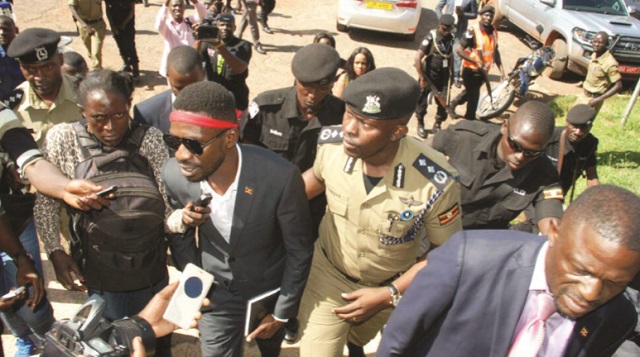
In a show of anger, the mainly opposition legislators and a few ruling party MPs descended on the parliamentary chairs and tore them, they grabbed microphone handles and used them as fighting sticks, hurled chairs at each other and at the security personnel. It was anarchy. But the MPs involved in it are being hailed as heroes.
Soon after the fight, caricatures of legislators Sewanyana and Kyagulanyi emerged online showing them wearing military fatigues and holding monster guns the kind only seen in adverts of Hollywood action movie stars. On the field of battle, opposition MPs who stayed out of the fray, like Ogenga Latigo, risk losing relevance.
On the other hand, Gen. Katumba Wamala who for the most of the melee in parliament could be seen calling for restraint, has been heavily lambasted over a picture that shows him punching an anti-age limit MP. Katumba’s victim, Francis Zaake ended up in hospital but on his Twitter page, Katumba tries to explain that he punched the legislator because he was throwing chairs at colleagues. That Katumba’s explanation appears to have drawn even more anger is revealing about who thinks they are justified to use violence as a means of politics and who is not.
Critics of President Museveni like Kizza Besigye say that the excesses of his government have pushed people on the wall so much that they are justified to unleash their rage.
Critics add that while the voters themselves have not risen up to fight, they are more willing to elect and shower praise on those who are ready to fight for them. Indeed, Kyagulanyi’s popularity rose amongst voters in Kampala when he started attacking Museveni’s government.
Sewanyana too made his bones as a councillor at the KCCA council where he was a fearless warrior in Mayor Elias Lukwago’s force. Lukwago is a top Besigye protégé.
Together with Lukwago, Kyagulanyi and Ssewanyana took on Museveni and his representative in the Kampala Capital City Authority (KCCA), Executive Director Jennifer Musisi.
Kyagulanyi, who is a singer under his `Bobi Wine’ alias even composed a protest song against KCCA titled `Tugambire Ku Jennifer’ that became an anthem against Musisi who was wielding the iron-hand of the state in Kampala.
More violence likely
It now means that since each war produces its generals, the Kyagulanyis and Ssewanyanas are the opposition commanders of the 10th parliament and the violence witnessed recently in parliament is likely to be repeated unless deliberate steps are taken to avoid it. There are even concerns of “normalisation of violence” since the siege on parliament follows a similar one on the High Court. Normalisation of violence has already happened in some parliaments, such as in South Africa, where the Economic Freedom Fighters (EFF) MPs routinely battle police in the chambers. Following one such incident on Feb.09, the Centre for the Study of Violence and Reconciliation (CSVR) warned that the normalisation of violence would have long-term repercussions for the country.
“When violence becomes the norm as a way to resolve our problems, it eats into the social fabric of our society,” said CSVR Executive Director, Nomfundo Mogapi. She added that normalisation of violence is a concern because even if new actors come to power, the habit of resorting to violence to deal with issues remains.
In their book, `Militarism and the Dilemma of Post-Colonial Statehood: The Case of Museveni’s Uganda’, Makerere University dons Busingye Kabumba, Dan Ngabirano and Timothy Kyepa, also show that militaristic persona, formations, and history of Ugandan politics have proved difficult to break. They describe how, since colonial times, governments including Museveni’s have relied on military violence to grab and retain power.
It is, no wonder, critics say, that as he seeks to extend his overstay in power in the face of increased disgruntlement, which is fueling outbursts of anger, President Museveni is more and more falling back on the military to fight back.
In response, people like Kyagulanyi and Ssewanyana arrive in parliament ready for a fight. For someone who had just been elected three months earlier, Kyagulanyi’s actions sent a message far sinister than the metal rod he brandished. But he had started criticising Museveni long before he came to parliament.
 The Independent Uganda: You get the Truth we Pay the Price
The Independent Uganda: You get the Truth we Pay the Price



